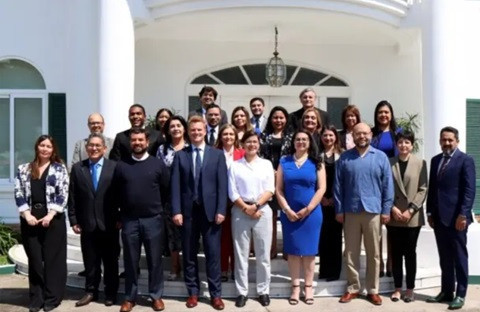
GCED Basic Search Form
Quick Search
Вы здесь
Новости

Judges and Directors of National Judicial Training institutions from 18 countries in Latin America and the Caribbean as participants at the AI and the Rule of Law Training organized by UNESCO from 15 to 17 November 2023, at the Inter-American Court of Human Rights in Costa Rica.
In a groundbreaking decision, the Colombian Constitutional Court has issued a ruling with significant implications for the use of artificial intelligence (AI) within the country’s judicial system.
The decision was prompted by a recent ruling in Colombia where the judge used ChatGPT to rule on whether a child with disabilities had to pay a fee to a health insurance company to access medical treatment, where the Court ruled that the child was exempt from paying the fees. Nonetheless, the use of ChatGPT, with widely known problems like hallucinations and bias, by the judge to reason in a matter related to the fundamental right to health raised alarm bells on whether such AI tools can be used for legal reasoning.
Emphasizing Human Oversight in AI Use in the Judiciary
The Constitutional Court highlighted the importance of AI as a tool for managing tasks and assisting in drafting judicial decisions. However, it stressed that judges should not overly rely on AI systems, as this could compromise the right to due process and the judiciary's independence and integrity. The court's decision underscored the necessity for judges to make value judgments, a task that cannot be delegated to machines.
Citing the UNESCO Recommendation on the Ethics of AI, the Court's ruling extends far beyond this individual case and laid out principles for AI use, that will have far reaching impact on other similar cases within the Colombian judiciary and beyond.
In its ruling, the Court integrates several important principles, such as transparency, privacy, the non-substitution of human rationality, verification, and alignment with best practices and collective standards.
Agneris SampieriPolicy Analyst for Latin America, Access Now
The Constitutional Court warns … when human beings simply copy and paste information without a review, it cannot only be incorrect or inaccurate, but false (...) a judge must make value judgments, that cannot be done by a machine.
Prof. Juan David GutiérrezAssociate Professor, Universidad de los Andes
Court highlights UNESCO’s Global Toolkit on AI and the Rule of Law
The Constitutional Court noted that UNESCO’s Global Toolkit on AI and the Rule of Law, “supplies elements of great value through guidance on laws, principles, norms and international jurisprudence of human rights relevant to the ethical use of AI, in order to mitigate its possible risks to human rights”.
Notably, during the hearings for the case, the Court invited testimonies from Prof. Juan David Gutiérrez and Agneris Sampieri, who are part of the UNESCO Network of Experts on AI and the Rule of Law and had delivered a training on AI and the Rule of Law based on UNESCO’s Toolkit to judges from 18 Latin American countries at the Inter-American Court of Human Rights in November 2023.
Call for Comprehensive Guidelines on AI
The court directed the Consejo Superior de la Judicatura, Colombia's judiciary governing body, to create training spaces that promote learning about AI in the judicial context, along with its risks and benefits, all with a rights-based perspective. Further, the court has directed the Consejo Superior de la Judicatura to publish comprehensive guidelines for AI use within the next four months. These guidelines should align with national and international best practices, ensuring the responsible and ethical use of AI while respecting human rights.
UNESCO is actively involved in fostering responsible AI use in the judiciary. It has developed draft Guidelines on the Use of AI in Courts and Tribunals, currently open for public consultation. These guidelines aim to create robust AI governance frameworks that respect human rights and uphold the rule of law, inviting contributions from judiciary actors, legal professionals, academics, and the public.
This ruling by the Colombian Constitutional Court marks a significant step in integrating AI into judicial processes while safeguarding fundamental human rights and judicial integrity.
UNESCO will continue support the judiciary in Latin America with trainings for judges at the regional and national level. The next training will be held in Paraguay in partnership with the Supreme Court of Justice.
